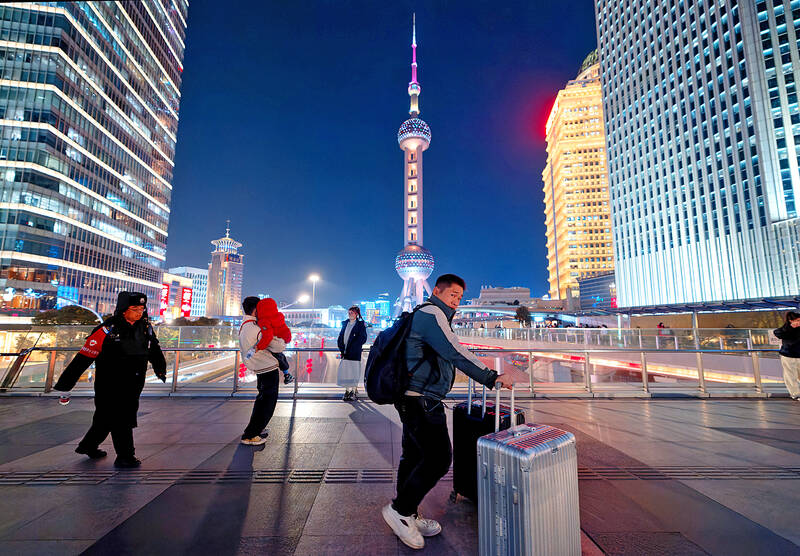China’s economy hit the government’s growth goal last year after an 11th-hour stimulus blitz and export boom turbocharged activity, although looming US tariffs threaten to take away a key driver of expansion.
GDP rose 5 percent in the world’s second-largest economy, data released by the Chinese National Bureau of Statistics yesterday showed, slightly exceeding the median estimate of 4.9 percent in a Bloomberg survey.
“The biggest bright spot in the economy last year was exports, which was very strong, especially if price factor was excluded,” BNP Paribas SA chief China economist Jacqueline Rong (榮靜) said. “That means the biggest problem this year will be US tariffs.”

Photo: EPA-EFE
China has vowed further monetary easing and stronger public spending this year, as its economy braces for US president-elect Donald Trump’s return to the White House.
Trump has threatened tariffs of as high as 60 percent on Chinese goods, which could decimate trade with the Asian country.
Those very threats encouraged global businesses to frontload shipments and bolstered growth last year. However, that boost might fade in the coming months, as potential levies, including from the EU and other trade partners, make Chinese exports less competitive.
The yuan strengthened 0.1 percent against the US dollar in onshore and offshore markets after the data release. The benchmark CSI 300 index of Chinese stocks erased an earlier loss of 0.5 percent to rise 0.5 percent.
“The government has repeatedly alluded to significant support. We see this forthcoming, as Friday’s data hammer home the pressing need. The imperative could become even greater in the case of higher tariffs hitting exports significantly,” Bloomberg economists Chang Shu and David Qu (曲天石) said.
While China’s nearly flawless record in reaching its headline growth target is frequently doubted, the broad set of data also suggests Beijing’s policy pivot since late September last year helped counter headwinds from a years-long property slump and entrenched deflation.
Industrial production beat estimates to rise 6.2 percent last month compared with the previous year, the fastest pace since April last year.
The picture for domestic demand is more mixed. While unemployment climbed for the first time since August last year and property sales continued to contract, consumption showed signs of an uptick in categories helped by the stimulus push.
Retail sales rose 3.8 percent in the last quarter, accelerating to the fastest pace last year after the government ramped up a program to subsidize purchases of appliances, cars and business equipment. That brought home goods sales growth to 12.3 percent, the highest since 2013.
“Front-loaded export orders certainly helped, but the improvement was not just seen in exports, but also in consumption, which was largely a result of purchase subsidies,” Macquarie Group Ltd China economics head Larry Hu (胡偉俊) said.
Economists led by Robin Xing (邢自强) at Morgan Stanley estimate that about 60 percent of the rebound in annual growth was caused by China’s policy to boost consumption and manufacturing investment, while the rest came from advanced shipments.

MULTIFACETED: A task force has analyzed possible scenarios and created responses to assist domestic industries in dealing with US tariffs, the economics minister said The Executive Yuan is tomorrow to announce countermeasures to US President Donald Trump’s planned reciprocal tariffs, although the details of the plan would not be made public until Monday next week, Minister of Economic Affairs J.W. Kuo (郭智輝) said yesterday. The Cabinet established an economic and trade task force in November last year to deal with US trade and tariff related issues, Kuo told reporters outside the legislature in Taipei. The task force has been analyzing and evaluating all kinds of scenarios to identify suitable responses and determine how best to assist domestic industries in managing the effects of Trump’s tariffs, he

TIGHT-LIPPED: UMC said it had no merger plans at the moment, after Nikkei Asia reported that the firm and GlobalFoundries were considering restarting merger talks United Microelectronics Corp (UMC, 聯電), the world’s No. 4 contract chipmaker, yesterday launched a new US$5 billion 12-inch chip factory in Singapore as part of its latest effort to diversify its manufacturing footprint amid growing geopolitical risks. The new factory, adjacent to UMC’s existing Singapore fab in the Pasir Res Wafer Fab Park, is scheduled to enter volume production next year, utilizing mature 22-nanometer and 28-nanometer process technologies, UMC said in a statement. The company plans to invest US$5 billion during the first phase of the new fab, which would have an installed capacity of 30,000 12-inch wafers per month, it said. The

Taiwan’s official purchasing managers’ index (PMI) last month rose 0.2 percentage points to 54.2, in a second consecutive month of expansion, thanks to front-loading demand intended to avoid potential US tariff hikes, the Chung-Hua Institution for Economic Research (CIER, 中華經濟研究院) said yesterday. While short-term demand appeared robust, uncertainties rose due to US President Donald Trump’s unpredictable trade policy, CIER president Lien Hsien-ming (連賢明) told a news conference in Taipei. Taiwan’s economy this year would be characterized by high-level fluctuations and the volatility would be wilder than most expect, Lien said Demand for electronics, particularly semiconductors, continues to benefit from US technology giants’ effort

‘SWASTICAR’: Tesla CEO Elon Musk’s close association with Donald Trump has prompted opponents to brand him a ‘Nazi’ and resulted in a dramatic drop in sales Demonstrators descended on Tesla Inc dealerships across the US, and in Europe and Canada on Saturday to protest company chief Elon Musk, who has amassed extraordinary power as a top adviser to US President Donald Trump. Waving signs with messages such as “Musk is stealing our money” and “Reclaim our country,” the protests largely took place peacefully following fiery episodes of vandalism on Tesla vehicles, dealerships and other facilities in recent weeks that US officials have denounced as terrorism. Hundreds rallied on Saturday outside the Tesla dealership in Manhattan. Some blasted Musk, the world’s richest man, while others demanded the shuttering of his